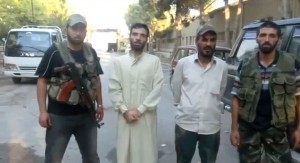Aleppo’s Kidnapping Trade

Rasha Rami
In Aleppo, hardly a day goes by without a kidnapping taking place, targeting victims from various faith groups and different political affiliations.
After a kidnapping, the victim’s family begins a journey to search for him or her, taking in both the government security services’ headquarters and the Free Syrian Army, FSA, brigades. The journey often ends with a phone call from members of the city’s notorious gangs, and a ransom demand.

Such abductions started happening before fighting broke out inside the city in July 2012.
“It took them less than five minutes to kidnap me,” recalled Michel, a 45-year-old doctor abducted outside his house in the Sulaimaniyya area. “A man in the street hit me over the head and then bundled me into a car. I was held for a week, which I spent inside a large wooden crate with a 19-year-old youth. We had to eat, drink and defecate inside it.”
“We were subjected to psychological torture – the kidnappers kept on threatening to kill us if they didn’t get the full ransom.”
Michel’s brother is a prominent security officer, and this led the family to accuse the FSA of carrying out the abduction. But it later transpired that the kidnappers were unaware the two men were related. They were interested solely in the money, a ransom of seven million Syrian pounds, equivalent to nearly 100,000 US dollars.
Michel was released when the ransom was paid. He does not know what happened to the young man with whom he was held. The man’s family could not afford the ransom.
While Michel was released, another abducted man, Wassim, was not so fortunate.
The 37-year-old was a known supporter of the Syrian government, and had sometimes been called a member of the shabbiha or pro-regime militia for justifying the state’s military operations. His friends had frequently told him not to lend open support to either of the parties to the conflict.
When he was abducted, however, it was not for political reasons. Apparently aware that he came from a well-off family, gangsters kidnapped him outside the office in Saadallah al-Jaberi square where he works as a mechanical engineer.
After lengthy negotiations, the kidnappers agreed to accept one-third of their original ransom demand of 30 million Syrian pounds, some 430,000 US dollars. They got the money, but communications stopped.
“The money was delivered by mediators, but unfortunately Wassim hasn’t been released, and we’ve received conflicting news, some of which suggests he has been killed,” his brother Ayham said.
In such cases, the mediators are often people from the same village or even family as the kidnappers, or sometimes individuals who have themselves been abducted in the past.
The kidnappers do not target only men, but women and minors as well.
On September 4, Asmaa was abducted in front of her house in broad daylight. Four men got out of a car and fired shots in the air to scare away the neighbours.
“I was not beaten up or sexually harassed, but getting death threats and being blindfolded for four days made me feel as I’d been held for a whole year,” Asmaa said, noting that she was tied to a bed during this time.
Asmaa is currently receiving intensive psychiatric treatment because of the trauma she experienced.
“The kidnappers behave in ways similar to what we see in thriller movies,” Asmaa’s father said. “They contacted us from different phone numbers, and changed the location where they were to pick up the money several times. This was despite the police… saying they didn’t have time to deal with such matters in view of the ongoing situation.”
Other people also report police ignoring their pleas for help in kidnap cases.
Saleh, a 35-year-old bodybuilding instructor, managed to escape a kidnapping attempt after handing over his car and 300,000 Syrian pounds (4,300 dollars) which he had with him.
“I convinced my attackers … that I’d be at the same location the next day and pay them more money. Then I went to the police station,” Saleh said. “But they said they wouldn’t waste time searching for the car, or ambushing the gang members during the money handover. They said they were on the alert for demonstrations and armed attacks. ”
Even though most kidnappings in Aleppo are the work of criminal gangs, the FSA and government security forces accuse each other of carrying out such acts.
“There are only two forces involved in it – first the gangs who have taken advantage of the revolution and realised that kidnapping will bring them quick returns,” says Abu Moaz, an FSA member. “The other force involved is members of the security forces, which won’t hesitate to sacrifice some of their shabbiha to discredit us and make some money.”
Michel’s brother, speaking on condition of anonymity, agreed that some gangs have no political affiliation. At the same time, he claimed, the FSA uses ransom money to buy weapons for the war on the regime.
